[Levy "At the Table" and "Out of the Game"] Regardless of feelings towards Levy, it is undeniable that his frugality and persistence secured Spurs the top Premier League profits, stable European results, and an impressive stadium, together creating Spurs’ "ecological niche" at the Premier League’s summit.
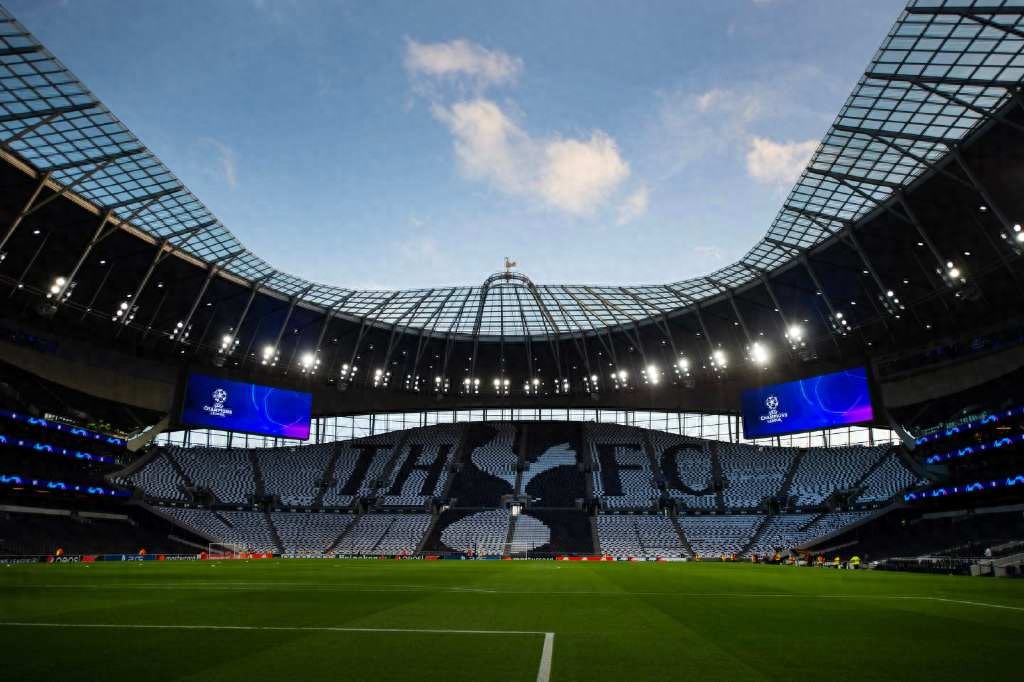
Written by Han Bing How to assess Spurs during Levy’s tenure? Even Spurs supporters hold vastly different views. Some praise Levy for elevating Spurs from a fallen giant to one of the financially strong top six clubs in the Premier League, successfully "getting to the table." Others blame his tightfistedness for the team winning only two trophies in nearly 25 years. Regardless of respect or resentment, no one disputes that Levy’s stinginess and stubbornness brought Spurs the Premier League’s highest profits, steady European qualifications, and a grand stadium, all of which forged Spurs’ "ecological niche" at the league’s top.
Levy held almost absolute power, single-handedly bringing Spurs "to the table" and securing their place among the Premier League’s top six. Even the ambitious second generation of the club’s majority shareholder, the Lewis family, stands on the "giant’s shoulders" Levy built for Spurs.

Rewinding to 2001 when Levy first became chairman, this lifelong Spurs fan faced a club unable to adapt to the Premier League. Defensive cornerstone Campbell had just left on a free transfer to bitter rivals Arsenal. In the previous nine Premier League seasons, Spurs never finished in the top six, with four finishes outside the top ten, relying on a single League Cup win to qualify once for European competition. Before the Premier League era, in the 12 top-flight seasons, Spurs won four trophies including the League Cup, finished in the top six six times, and earned three third-place finishes.
Beyond poor results, Levy confronted a greater challenge: financial crisis. Before ENIC’s takeover in the 1999/2000 season, Spurs’ revenue was only £48 million, with a net profit of just £100,000. Compared to two North London clubs with similar stadium capacities, Spurs’ revenue was less than 60% of Arsenal’s, who soon secured approval for a new 60,000-seat stadium. With Chelsea and Manchester City acquired by wealthy owners and Liverpool revived by Champions League success, Levy’s urgent task was to halt Spurs’ decline and seize the opportunity to "get to the table" amid the Premier League’s global expansion.
Unable to expand the stadium like Manchester United and Arsenal in the short term, Levy’s method to build wealth was to cut costs first, then increase income. His penny-pinching and stubbornness made him the Premier League’s "least popular" negotiator in the transfer market. One club CEO said, "After dealing with Levy once, you never want to do it again." His strategy of buying low and selling high, buying less and selling more, caused frustration among rivals. Ferguson even said negotiating the Berbatov deal was more painful than his hip replacement surgery.
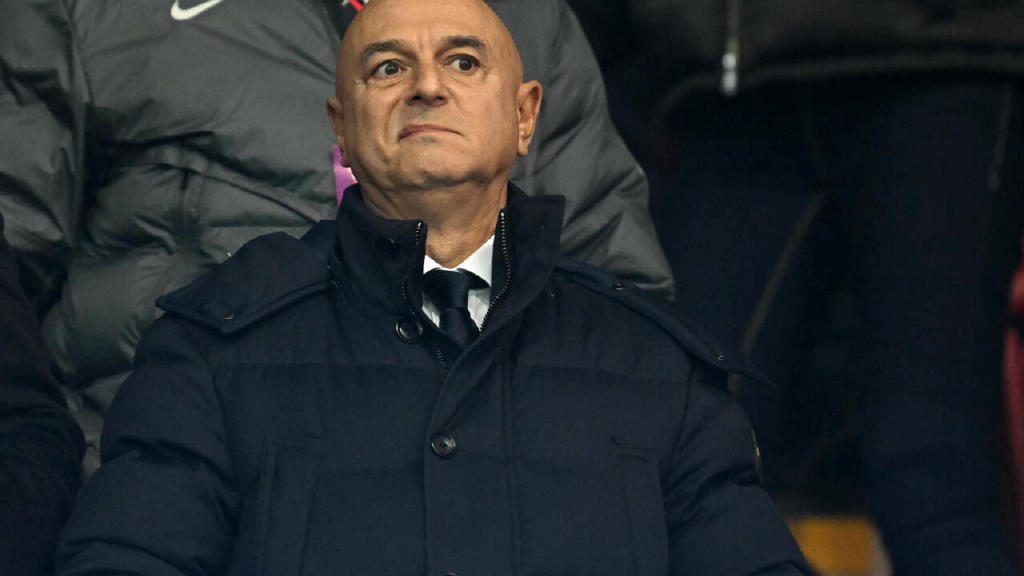
Levy’s stinginess only eased in his eighth season, when transfer spending exceeded €100 million (€144 million), while player sales brought in €88 million, making the net spend just €56 million. In the first ten seasons of Levy’s era, total transfer spending was €518 million, with sales of €233 million, resulting in a net spend of only €285 million, averaging less than €28.5 million per season. Correspondingly, Spurs only reached European competition in Levy’s sixth season and qualified for the Champions League for the first time in his tenth season.
Levy not only fiercely suppressed transfer prices and tried to retain key players but also strictly controlled the first team’s wage bill, keeping it the lowest among top Premier League clubs. Even when Spurs’ annual revenue surpassed €600 million, the wage-to-income ratio remained just 42%, the lowest among the big five leagues. This sound financial health made Spurs the Premier League club with the highest cumulative profits during Levy’s tenure. Before the pandemic hit in the 2019/20 season, Spurs made profits in 16 out of 18 seasons under Levy — uniquely unmatched in the Premier League.

The biggest criticism from fans during Levy’s era was his unwillingness to invest more in transfers. Even when the team had a chance to compete for titles, he refused to strengthen the squad further. From the 2006/07 season, Spurs qualified for the League Cup three seasons in a row, but Levy sold Carrick, Defoe, Robbie Keane, and Berbatov, earning nearly €100 million. In the 2010/11 season, Spurs’ first Champions League campaign in the Premier League era, they only signed Van der Vaart, Sandro, and free agent Gallas.
Starting from the 2009/10 season, Spurs finished in the Premier League top eight for 15 consecutive seasons, qualified for European competition 13 times, and played in the Champions League six times. Levy prioritized cost-effectiveness in hiring managers beginning with Hoddle. Of the 13 permanent managers during Levy’s era, only Pochettino, appointed in summer 2014, provided the stability Spurs needed. Under Pochettino, the team played in the Champions League for four straight seasons but lost three cup finals and two semi-finals during that period.
Except for the fortunate 2019 Champions League final, Levy seemed indifferent to other cup opportunities. Spurs consistently secured top-four Premier League finishes to qualify for the Champions League and earn substantial prize money. It was not until summer 2019, after four consecutive Champions League seasons, that Spurs made their first "€50 million+" signing. From that transfer window onward, boosted by soaring Premier League broadcast deals and Champions League revenues, Levy began investing heavily in transfers. In the last six seasons, Spurs spent over €100 million in five of them, totaling more than €1.2 billion — surpassing the previous 18 seasons combined. Meanwhile, player sales reached €368 million, with stars Eriksen, Kane, and Son leaving in succession.
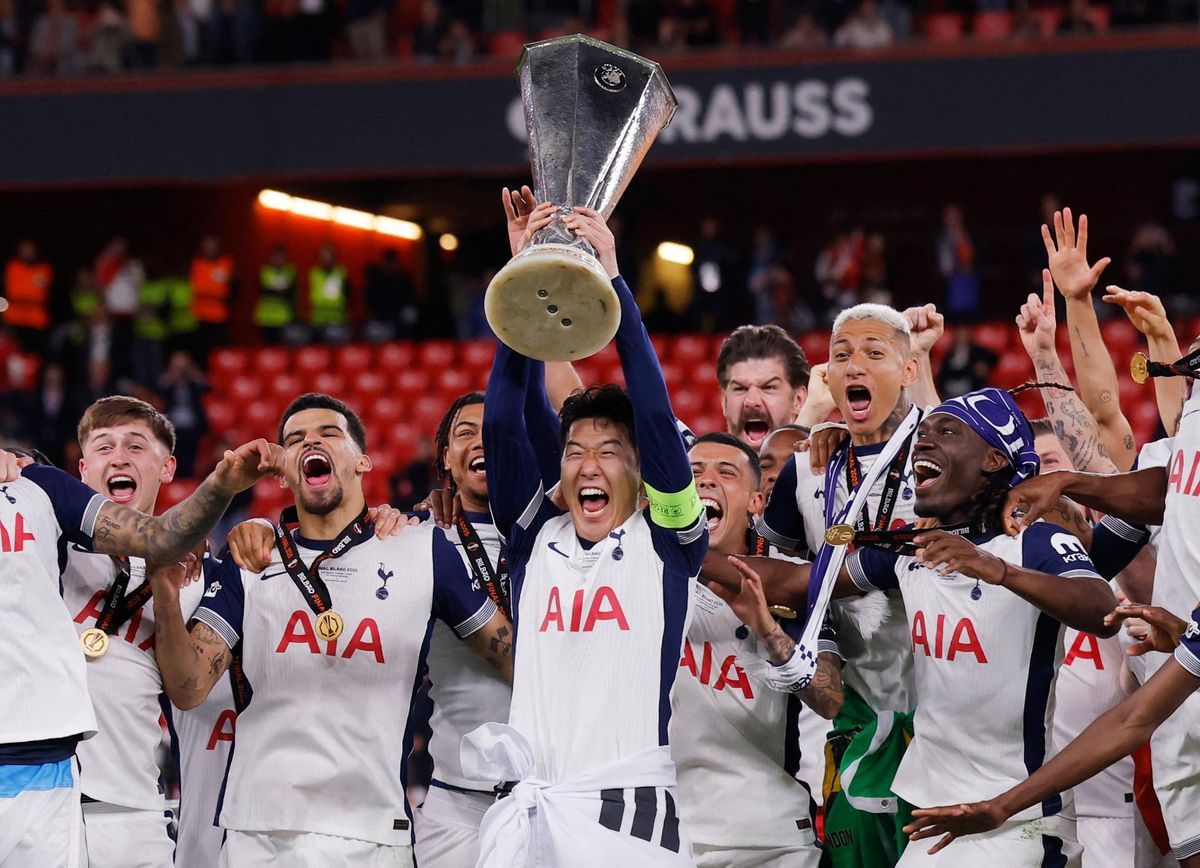
In the elite "ecological niche" Levy built for Spurs, maintaining a minimum return rate with steady results outweighed the pursuit of trophies. Transfers were aimed not at winning titles but at securing at least fourth place for Champions League qualification and guaranteed tens of millions in revenue. Even in the closest title challenges — the 2011/12 season and the 2018/19 Champions League final run — Levy never considered additional investment to boost winning chances. In the 2018/19 summer window, Spurs were the only club among the big five leagues not to sign any players, costing them the opportunity to challenge for the Champions League trophy.
For Levy, trophies were never the priority; instead, maximizing returns with cost-effective results was key. Since the 2009 League Cup, Spurs lost four domestic cup finals in a row. Fans have long been frustrated with Levy’s stinginess in transfers, especially his continual sale of key players. But Levy believed it was better to maximize returns from core players who would leave anyway. Maintaining a baseline of Champions League qualification and reinvesting those revenues in new signings was central to Levy’s sustainable club management.
The relatively stable league positions and consistent European qualifications in Levy’s later years marked an unprecedented "golden era" in Spurs’ history. These steady league and European results generated substantial returns, providing crucial support for Spurs to secure and maintain their Premier League top-six "ecological niche" on the field.

When Levy took charge in 2001, rival Arsenal’s 60,000-seat stadium plan was already underway. Levy first proposed expanding White Hart Lane in 2007, and in 2008 successfully included the new stadium in the local Northumberland development project. However, repeated revisions and delays stalled the plan. Levy then competed unsuccessfully with West Ham to lease the London Olympic Stadium, returning to the new stadium plan only in 2012.
In 2016, the London mayor approved the new stadium project, increasing capacity to 62,850. The stadium was designed to host both rugby union and American football games. Its acoustics were optimized for excellent sound, making it an ideal venue for concerts. Each year, the stadium hosts around 30 large non-football events, including rugby, concerts, professional boxing, and go-kart racing.
The stadium’s cost soared from the initial estimate of £400 million to £1.2 billion. Levy had to borrow £637 million from banks in three rounds, repaid over 23 years with annual installments of £30 million. This financial burden explains why Levy remained so frugal during his second decade. Spurs’ current debt exceeds £800 million, mostly due to the new stadium. Nevertheless, the stadium remains Levy’s most valuable legacy to the club and the strongest foundation for Spurs to maintain their Premier League top-six "ecological niche."
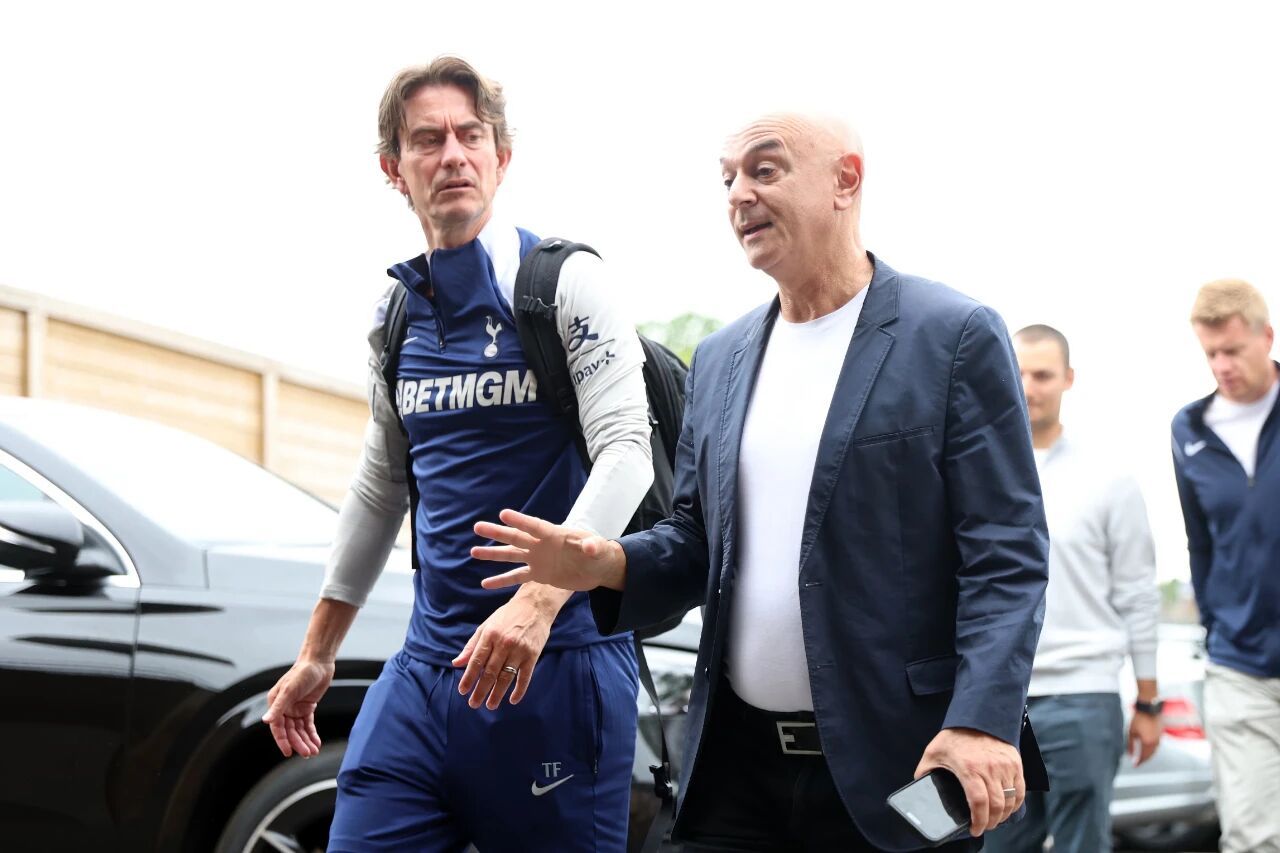
For the 2024/25 season, Spurs’ matchday revenue is expected to match the 2022/23 season (€135 million), ranking second only to Manchester United in the Premier League, comparable to Arsenal and Liverpool, and exceeding Manchester City. Tottenham Hotspur Stadium is the largest club stadium in London by capacity, generating nearly €7 million per matchday. This is thanks to Levy’s emphasis on maximizing commercial opportunities during the stadium’s design, with catering alone producing €1.2 million in revenue per game. As early as 2015, Levy signed a 10-year deal with the NFL, which holds at least one overseas game annually at Spurs’ stadium.
Revenue from catering at NFL games hosted by Spurs is three times that of football matches, with merchandise commissions also exceeding football figures. In 2025, Beyoncé’s "Renaissance" world tour will hold six consecutive nights at Spurs’ stadium, drawing nearly 300,000 attendees. Spurs will net over €7 million from the Beyoncé concerts alone. Future developments next to the stadium include a 30-story hotel and surrounding commercial apartments. An Ernst & Young report shows that in the 2021/22 season, Spurs’ stadium generated over €400 million for three local communities, with projections rising to €685 million by the 2026/27 season.
Levy left behind not only over €600 million in annual revenue, a top Premier League squad, and a grand stadium generating at least €100 million per season, but also a top-tier "ecological niche" enabling Spurs to challenge any Premier League giant. Anyone opposing Levy should acknowledge that his 25 years of leadership elevated Spurs into the Premier League’s top six "ecological niche," securing his place in the club’s history forever.
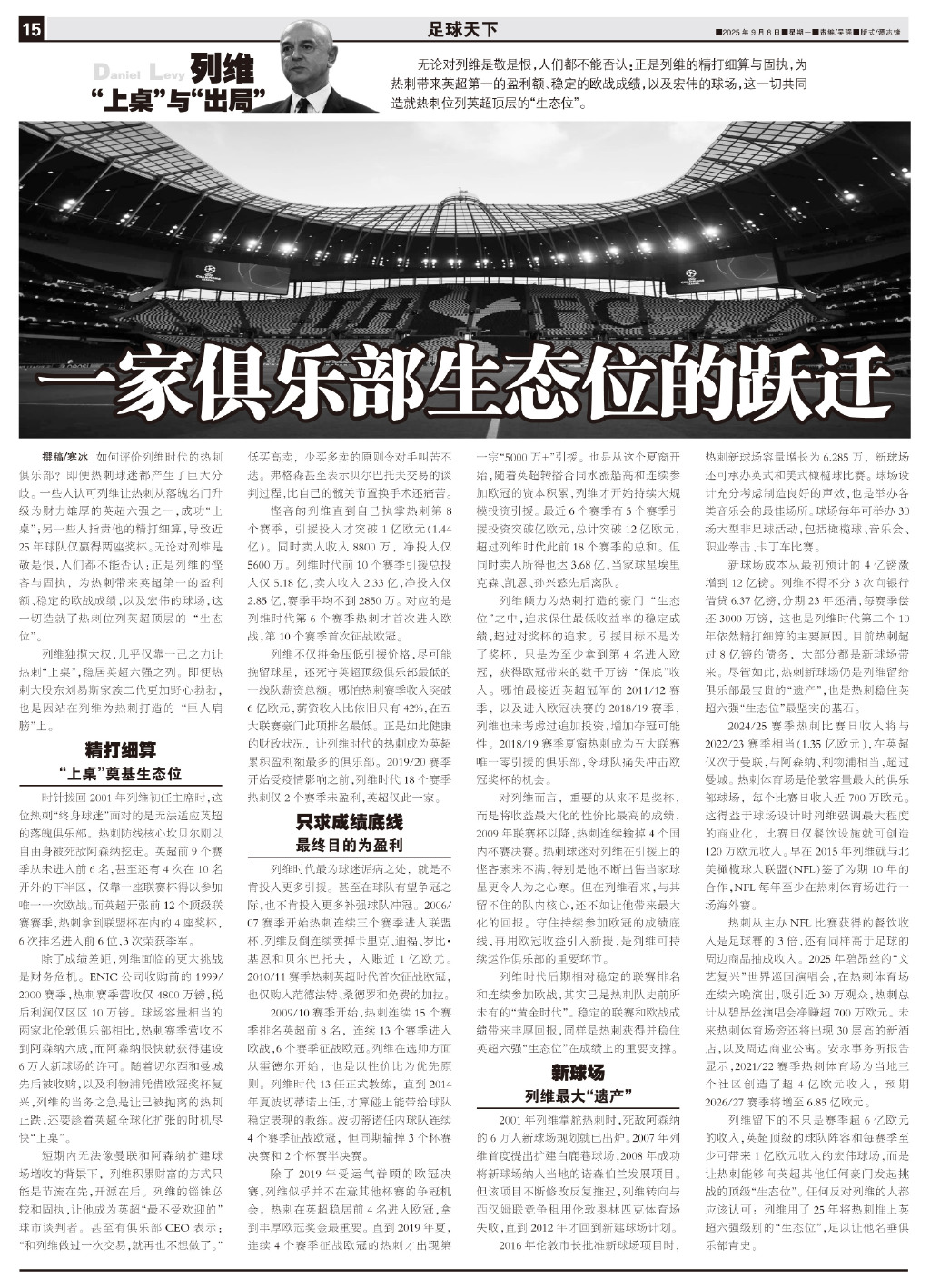























 Links
Links
 Contact
Contact
 App
App


